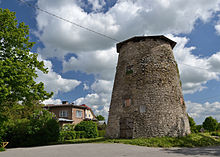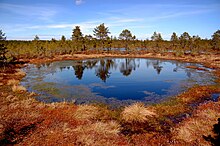The northern region of Estonia is the most visited region in the country.
Cities, towns and villages
[edit]- 1 Tallinn – The capital, and financial and cosmopolitan centre of Estonia, with a medieval Old Town. Beautiful and expensive.
- 2 Aruküla – A small borough
- 3 Kaberneeme – A coastal village
- 4 Käsmu – A coastal village inside of Lahemaa National Park.
- 5 Kunda – A small town with a historic cement plant and port on the shore of the Gulf of Finland.
- 6 Laulasmaa – A coastal village
- 7 Maardu – The industrial town in the eastern side of Tallinn, known for location of the largest cargo port in Estonia.
- 8 Paldiski – A coastal and formerly closed military town during the Soviet era.
- 9 Rakvere – Estonia's fifth largest city, east of Tallinn, famous for its Punk and Rock festivals and spirit.
- 10 Tapa – A junction railway station and one of the largest ex-Soviet military towns in Estonia.
- 11 Türi – The spring capital of Estonia with a range of monuments of Estonian functionalism.
- 12 Võsu – A small coastal borough inside of Lahemaa National Park.
Other destinations
[edit]- 1 Lahemaa National Park – On the coast within an hour east (50 km) of Tallinn. Given its size it is the largest park in Estonia and one of Europe's biggest national parks, with 1,000 km2 of bogs, trails, coastline, forests, and 4 manors. It allows for convenient up to medium difficulty day trips and hikes from Tallinn.
Understand
[edit]


North Estonia contains the capital Tallinn, whose UNESCO-protected medieval Old Town is the country's premier attraction. The region covers four counties: Harjumaa (Rugel), Lääne-Virumaa, Raplamaa and Järvamaa. North Estonia is one of the most developed and industrial regions (together with East Estonia). It has the largest population, continuously growing.
Unlike the crowded Tallinn, the rural part of Northern Estonia enjoys incomparably less popularity. However, there are impressive natural attractions: the bogs and boulders of Lahemaa Park, coastal rocks and major Estonian waterfalls. There is also a share of architectural values in the region – from medieval churches, castles, and manors to the architecture of the 20th century.
This region was dominated by Denmark in the 13th century until the "Revolt of the Night of St. George".
Get in
[edit]Tallinn contains Estonia's main port and airport. If arriving from Latvia or Russia overland along major roads the road signs say "Tallinn" all the way from the border. There are also direct trains from Saint Petersburg.
Get around
[edit]Bus and train schedules are easily available online – read more under Estonia#Get around.
By bus
[edit]Most villages, towns and cities are connected by regular bus services. Smaller places are often only served in the morning or noon, and late afternoon (17/18:00). Cities generally have buses up to 21:00. Make sure, you do not miss the last bus.
- Põhja-Eesti Public Transport Centre. Public transport authority in North Estonia.
See
[edit]- Jägala Falls are Estonia's largest waterfall. During cold winters, Jägala Falls freezes in a spectacular fashion and is well worth seeing.
- Kunda Cement Museum, in Kunda, north of Rakvere.

- Ämari Pilots’ Cemetery, south of Paliski, is the last resting place of a number of Estonia's fighter pilots who served in the air force under Soviet rule before 1991. Pilots of which the aircraft were downed and recovered have their graves decorated with the tail fin of their aircraft instead of a generic tomb stone, making the cemetery look like a squadron of jet fighters buried in the forest.


- Several manor houses are mostly found around Rakvere. There are 4 more in Lahemaa National Park.
- Two points of the Struve Geodetic Arc world heritage site are found just outside the village of Simuna, 41 km south of Rakvere. Woibifer/Võivere has a windmill that served as a triangulation point and has now been restored into a visitors' centre. Next to the windmill is a marker in the ground protected by a vitrine. Katko has a little stone pillar in the field marking the end of the Simuna line.
Do
[edit]- Hiking in Lahemaa National Park
- Enjoying the beaches of the northern Estonian coast
- Fishing: at a trout farm in the northern outskirts of Halyal (10 km from Rakvere to the north). Fishing in the pond (hire fishing rods and selling food, as well as a free opportunity to dig worms for fishing). There, for a fee, the catch is smoked. Including restaurant and playground.
- The Viking village near Aruküla is a theme park in a deep forest. It's a scenic place with a tavern, accommodation and its own small lake, from where everyone can catch their own fish and get it cooked. It is suitable for a day out with kids but too tacky for adults.
- Vembu-Tembumaa is a large amusement park for the whole family south of Tallinn.
- Atlantis H2O Aquapark, northeast of Tallinn, has lots of fun water equipment: a wave pool, a flow pool and eight different slides, the longest of which is over 120 m. For toddlers, there is a separate area with two smaller slides, a climbing area and a 0.20 m deep swimming pool.
Eat
[edit]Drink
[edit]Sleep
[edit]Go next
[edit]- West Estonia and Islands – Islands, Baltic Sea, spas, beaches, and wild life habitat for birds moving towards the south in fall.
- East Estonia – Beautiful north coast of Lake Peipsi, and gateway to Russia through the border city Narva. More people speak Russian than Eesti here.
- South Estonia – Famous for the intellectual hub, ancient city and university town Tartu, and many picturesque town like Viljandi.


